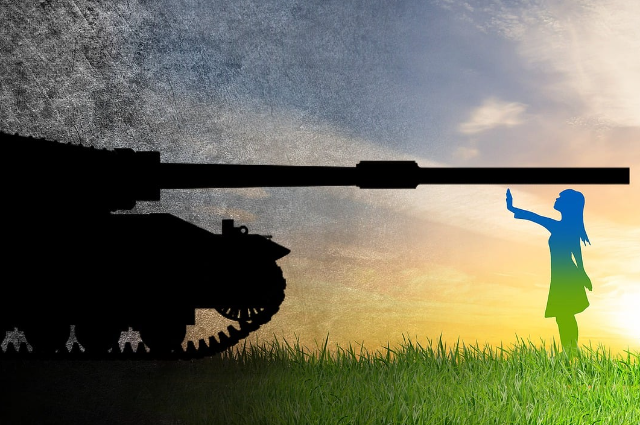
Image by Peace,love,happiness from Pixabay
“War is nothing but a continuation of politics by other means.” - Clausewitz
Wars have been seen throughout history, ageing back in myths, to world wars, and current eras. With wars ranging from the longest (between Britain and France, lasting 113 years, ending in 1453), to the shortest (Anglo-Zanzibar war lasting just 40 minutes), to wars that have killed more animals than people (NATO attack on Serbia in 1999), wars have been a source of mayhem and destruction for ages. The causes of wars have differed over time, such as geographical, economic, ideological, religious, etc. As Clausewitz stated, wars are just a continuation of politics--if the demands of the countries aren’t met, then people resort to hard power. However, recently, what changed?
The two big conflicts of the 20th century that still have an impact on the world today—World War I and II—were enormous displays of hard power through the military's global dominance. People were displaced from their homeland (refugees) due to wars. During the 1st world War, explosions in Ypres (Belgium) were heard in London, leading to widespread panic and mass displacement. Wars turned out to be too great of a risk, yet several wars were fought in the past for the sake of it.
"Peace" enters the picture after these battles. The world learned from its errors and created a more dependable peace organisation, the United Nations, after the failure of "The League of Nations." The UN approaches global issues with soft power and accords each issue equal weight while supporting international diplomatic ties. Major nations maintain diplomatic relations by stationing a diplomat abroad, or the president visiting countries. If the UN hadn’t been established after WW2, maybe the world wouldn’t be as it is today. However, the UN is still incompetent in several scenarios. For example, the recent Russia-Ukraine war still doesn’t have a solution because votes are biassed through Russia’s veto power. If such a case continues, how will the two countries ever agree? Some changes can be made to the UN to avoid these cases, like removing the veto powers altogether. Veto powers were established at the end of the Second World War, where the winning countries elected themselves as the countries in power, and the effects of which are still seen to date, where these countries constantly overrule the majority voting in the council. Decisions in the UN council should be taken by majority voting itself, eradicating the process of showcasing dominance just because a country is deemed as a “superpower” or is “developed.” This will lead to fairer results in each meeting, with the votes being unbiased and the drafted resolution in support of the majority.
Another idea for maintaining peace is as stated by Friedman, an American Political Commentator and Author, in his Dell's theory. In his book, The World is Flat, he explored various ideas connecting the 21st century and globalisation. The one that caught the eye of millions is Dell’s Theory, which demonstrates how, in the twenty-first century, peace is essential for a country's survival. According to the theory, no two countries that are both members of a significant worldwide supply chain will ever engage in conflict with one another as long as they are both a part of that global supply chain. Globalisation encourages more interconnection between states. For example, India and China have had a history of conflicts since 1962, but since India gets various goods at cheaper prices from China, they both have maintained peace in the 21st century.
A theory pioneered by C. Wright Mills, an American Sociologist and Professor in the 20th century, is the Conflict Theory, which is superseded by Dell's thesis. According to conflict theory, there is always conflict in society due to competition for few resources. What need is there for competition if people share resources and engage in a global supply chain? This is, if the trades continue without any barriers. Nations have started to put various kinds of sanctions, which promote conflicts that result in wars. One of the infamous examples of this is the US-China trade war, which started to show “global dominance,” but is turning into something much more. With the US and China playing games by introducing sanctions and tariffs on their products, both countries will be equally harmed. If this is not quelled, then escalating tensions can lead to the use of hard powers and the displacement of millions.
With the wars increasing asylum seekers/refugees and harming the natural ecosystems, the individuals can speak their views and pressurise the countries to a ceasefire. Some ways individuals can state their opinions and take action to promote peace are through petitions/posts on Instagram, donations for rescuing refugees, protests, and several more.
The world has become more of a comfortable place to live in, where people have started to accept everyone. Some countries have been taking several steps to establish diplomatic relations. On the other hand, countries are still engaging in wars, like Israel-Palestine, whose solution is yet to be founded. Maintaining peace globally is a goal the whole world is still striving to achieve, but after how many wars and casualties will peace be finally established and maintained?
